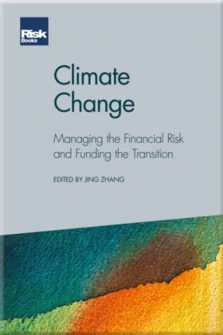Evidence-based climate stress testing
Tony Hughes
Foreword
Introduction
Sustainability for critical ecosystems: The future of risk management – more of the same or a new paradigm?
Climate change is a source of financial risk
The climate disclosure landscape in the finance sector
Green boxes? An overview of climate risk tools and analytics
Embedding climate change in financial metrics
Modelling climate physical risks
Climate-related stress-testing: Transition risks
Catastrophe risk modelling and climate change
Evidence-based climate stress testing
Climate risk drives a new paradigm in risk management
Incorporating climate change in asset allocation and portfolio construction
(Car)bon voyage: The road to low-carbon investment portfolios
Climate risk primer for community banks: Concepts and policies during a period of significant change
Next-generation analytics for climate finance
Climate finance post-COP26
Mobilising private funding
As the tangible effects of global warming have become more obvious, demand for political action has grown. In the past few years, central banks around the world have increasingly sought to use the power of local and global financial flows to reverse the trend toward higher temperatures. Allied to these aims, there is demand for a better understanding of the effects of climate change on the financial system. If global warming continues along its established path, asset values may be threatened by physical risks, which in turn would impact the financial performance of consumers and businesses, and thus banks and insurers. Conversely, if stern action is taken to address warming, either in the form of aggressive government policy or through grassroots consumer activism, existing economic patterns will shift, potentially causing a disruption to the financial sector.
EVIDENCE-BASED CLIMATE STRESS TESTING
Questions about bank safety and credit risk are empirical in nature. Over time, the climate-related data that we collect will improve in quality and quantity, and statistical methods used to analyse the data will advance. At present, our understanding of the effect of climate
Copyright Infopro Digital Limited. All rights reserved.
As outlined in our terms and conditions, https://www.infopro-digital.com/terms-and-conditions/subscriptions/ (point 2.4), printing is limited to a single copy.
If you would like to purchase additional rights please email info@risk.net
Copyright Infopro Digital Limited. All rights reserved.
You may share this content using our article tools. As outlined in our terms and conditions, https://www.infopro-digital.com/terms-and-conditions/subscriptions/ (clause 2.4), an Authorised User may only make one copy of the materials for their own personal use. You must also comply with the restrictions in clause 2.5.
If you would like to purchase additional rights please email info@risk.net











